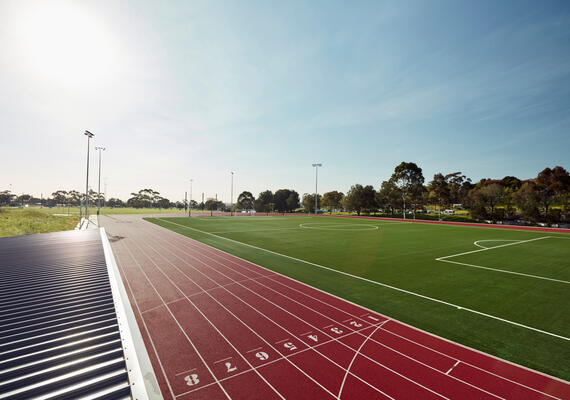
Improving athlete performance
Athletes can utilise the evidence and adopt heat prevention strategies that give them a competitive advantage at sporting events.
New research aims to identify the enablers and barriers for following heat preparation guidelines in professional sport. The research team, led by Dr Amelia Carr and Associate Professor Helen Brown, have received a grant from the Australian Institute of Sport (AIS). They will use an Implementation Science approach to support athletes and coaches to adopt and use the latest evidence in heat preparation in a timely way.
Deakin University sports scientists have received an Australian Institute of Sport (AIS) grant to better understand how coaches, athletes and high-performance managers adopt and use heat preparation guidelines.
With a substantial body of evidence already established within published literature about how good preparation can support performance when competing in hot conditions, the research team, led by Dr Amelia Carr and Associate Professor Helen Brown from Deakin’s School of Exercise and Nutrition Sciences aims to identify the enablers and barriers for following guidelines on heat preparation.
The team will collaborate with researchers from Athletics Australia, the Victorian Institute of Sport and Paddle Australia, and partner organisations Athletics Australia, Rowing Australia, Paralympics Australia and the Australian Olympic Committee. The knowledge generated from the study will support national sporting organisations to prepare for future events such as World Championships for able-bodied and para-athletes, and Summer Olympics and Paralympics, set to be held in Paris (2024), Los Angeles (2028) and Brisbane (2032).
Dr Carr says that there is a substantial body of evidence that documents how competing in hot conditions can be physically challenging for elite and professional athletes, and there are several ways to prepare and adapt to these conditions.
‘There’s a number of evidence-based strategies, such as heat acclimatisation (training outdoors in naturally occurring hot and/or humid conditions), heat acclimation (training within temperature and humidity-controlled climate chambers), external and internal cooling strategies, hydration strategies and other nutritional techniques,’ Dr Carr says.
‘Heat preparation guidelines have been established, and these are designed to protect athletes’ health and to reduce performance impairments. Heat exposure, particularly in conditions where the temperature is more than 25°C can lead to an increase in core temperature and in heart rate, and the published literature has shown that the decrement to performance due to heat exposure can be up to 10% in some sports.’

Athletes can utilise the evidence and adopt heat prevention strategies that give them a competitive advantage at sporting events.
With Australian weather being warm year-round in northern states, and with climate change warming the globe more broadly, it’s more important than ever that sporting codes, teams, coaches and athletes have access to the best possible evidence to prepare for competition and protect their health, and also have the technology and equipment to use the recommended strategies.
‘We know it can take up to 17 years for new research to be adopted and implemented’ says Associate Professor Brown.
‘This study will therefore use an Implementation Science approach to support athletes and coaches to adopt and use the latest evidence in heat preparation in a timely way.’
‘The problem is that we have evidence-based have International Olympic Committee (IOC) guidelines, but we don’t currently know the rates of adoption and use of these guidelines, by athletes and those who support them, like coaches and sport scientists.’
Dr Carr said the research team have now commenced work to understand the raft of information already available and will then interview athletes, coaches, sports scientists, high-performance managers and other support staff.
‘Our work will pave the way for further research implementation strategies, so we can maximise adoption and sustained use of practical guidelines to provide Australian athletes with a competitive advantage at major international events.’
This article was written by Deakin researchers Associate Professor Helen Brown and Dr Amelia Carr. The text of this article is licensed under the Creative Commons Attribution (CC BY) 4.0 International license.